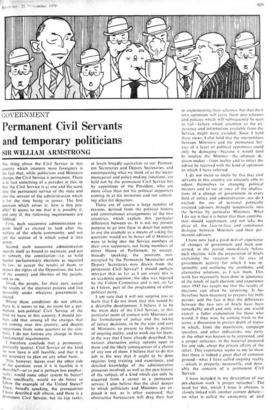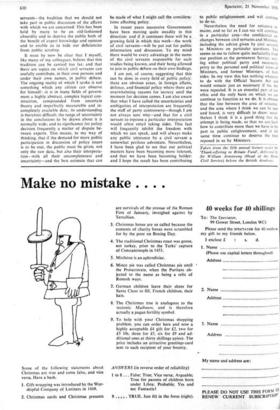GOVERNMENT
Permanent Civil Servants and temporary politicians
SIR WILLIAM ARMSTRONG
The thing about the Civil Service in this country which interests most foreigners is the fact that, while politicians and Ministers change, the Civil Service is permanent. There is in fact something of a paradox in this, in that the Civil Service is at one and the same time the permanent service of the state and also the servant of the administration which is for the time being in power. The first question which arises is: how is this pos- sible? It seems to me that it is possible if, and only if, the following requirements are fulfilled: First, each successive administration re- gards itself as elected to look after the welfare of the whole community, and not just the section of it which voted it into power.
Second, each successive administration regards itself as bound to maintain, and not to subvert, the constitution—i.e. to hold regular parliamentary elections as required by law, to accept the results of them, to respect the rights of the Opposition, the laws of the country and liberties of the people, and so on.
Third, the people, for their part, accept the results of the electoral process and live peaceably under whatever government is elected.
Where these conditions do not obtain, there is, it seems to me. no room for a per- manent. non-political Civil Service of the kind we have in this country. I should per- haps add that among all the changes that are coming over this country, and despite suggestions from some quarters to the con- trary, I do not foresee any change in these fundamental requirements.
I therefore conclude that a permanent, politically neutral, Civil Service of the kind We now have is still feasible, and that it i,s not necessary to plan on any other basis. This, however, leaves over the other side of the question: even if it is feasible is it desirable?—or to put it perhaps less emphat- ically: would some other system be better? More specifically, would we do better to follow the example of the United States? There, broadly speaking, the prerequisites I have described still obtain, and there is a Permanent Civil Service; but its top ranks,
at levels broadly equivalent to our Perman- ent Secretaries and Deputy Secretaries, and encompassing what we think of as the major managerial and policy-making functions, are held not by the permanent Civil Service but by appointees of the President, who are more often than not his political supporters coming in at his invitation and not remain- ing after his departure.
There are of course a large number of reasons, derived from the political history and constitutional arrangements of the two countries, which explain this particular difference between us. It is not my present purpose to go into these in detail but simply to use the example as a means of asking the question: would we be better off if Ministers were to bring into the Service numbers of their own supporters, not being members of either House of Parliament. to occupy, broadly speaking, the positions now occupied by the Permanent Secretaries and Deputy Secretaries now drawn from the permanent Civil Service? I should perhaps interject that so far as I am aware this is an academic question; the idea was rejected by the Fulton Committee and is not, so far as 1 know, part of the programme of either political party.
I am sure that it will not surprise you to learn that I do not think that this would he a desirable development. I believe it to he the main duty of the Civil Service, at this particular point of contact with Ministers on the formulation of policy and the taking of policy decisions, to be the eyes and ears of Ministers, to present to them a picture of ongoing reality, and to work out for them, in the way that I have already described, the various alternative policy options open to them and the likely consequences of a choice of any one of them. I believe that to do this job in the way that it ought to be done requires long training and experience, and detailed knowledge of the administrative processes involved, as well as the past history of the subject, of a kind which can only be acquired from a career in a permanent service. I also believe that the chief danger to which politicians and Ministers are ex- posed is not, as is often supposed, that obstructive bureaucrats will drag their feet in implementing their schemes, but that their own optimism will carry them into schemes and policies which will subsequently be seen to fail—failure which attention to the ex- perience and information available from the Service might have avoided. Since I hold these views, I also hold that the interposition between Ministers and the permanent Ser- vice of a layer of political appointees could only be damaging—because it would tend to insulate the Minister—the ultimate de- cision-maker—from reality and to infect the advice he received with the kind of optimism to which I have referred.
I do not mean to imply by this that civil servants in this country are uniquely able to adjust themselves to changing political masters and to see at once all the implica- tions of a change of government in every field of policy and administration: nor do I exclude the use of personal politically oriented advisers brought temporarily into the Service by particular Ministers. What I do say is that it is better that their contribu- tion should supplement, and not take the place of. the face-to-face and continuous dialogue between Ministers and their per- manent advisers.
I have now had a good deal of experience of changes of government and been con- cerned. in the period immediately before each election, with the preparation of briefs explaining the situation in the area of government activity for which I was re- sponsible and outlining the problems, and alternative solutions, as I saw them. This work has necessarily been done in ignorance of the result of each election, and experience since 1945 has taught me that the results of elections can often be surprising. It has therefore been necessary to prepare for both parties: and the fact is that the differences between the two sets of briefs have been remarkably small and only what one would expect: a fuller explanation for those who would, if they won, be coming fresh to the scene. a discussion in greater depth of topics in which, from the manifestos. campaign speeches, and other indications. one party or the other was known to he interested, and a proper reticence, in the material prepared for one side, about the private affairs of the other. This experience seems to me to show that there is indeed a great deal of common ground—what I have called ongoing reality —which is properly. necessarily, and desir- ably the concern of a permanent Civil Service.
T have included in my description of our pre-election work 'a proper reticence'. The need for this, which I hope is obvious, is closely linked with another current debate— on what is called the anonymity of civil servants—the tradition that we should not take part in public discussion of the affairs with which we are concerned. This has been held by many to • be an old-fashioned absurdity and to deprive the public both of the benefit of expert knowledge and opinion and to enable us to hide our deficiencies from public scrutiny.
It must by now be clear that I myself, like many of my colleagues, believe that this tradition . can be carried too far, and that there are topics on which civil servants can usefully contribute, in their own persons and under their own names, in public debate. The ongoing reality of which I spoke is not something which any citizen can observe for himself: -it is in many fields of govern- ment a highly abstract, complex logical con- struction, compounded from uncertain theory and imperfectly measurable and in- completely available data; its understanding is therefore difficult; the range_of uncertainty in the conclusions to be drawn about it is normally wide; and its significance for policy decision frequently a matter of dispute be- tween experts. This means, to my way of thinking, that if the demand for more public participation in discussion of policy issues is to be met, the public must be given, not only the raw data, but also their interpreta- tion—with all their uncompleteness and uncertainty—and the best estimate that can be made of what I might call the considera- tions affecting policy.
In recent years successive Governments have been moving quite steadily in this direction: and if it continues there will be a growing field in which this work—the work of civil servants—will be put out for public information and discussion. To my mind there would be every advantage in the name of the civil servants responsible for such studies being known, and their being allowed to join in public debate on their own findings.
I am not, of course, suggesting that this can be done in every field of public policy: there are obvious areas, in foreign affairs, defence, and financial policy where there are overwhelming reasons for secrecy until the moment for decision comes. I am also aware that what I have called the uncertainties and ambiguities of interpretation are frequently the stuff of party controversy—though I am not always sure why—and that for a civil servant to espouse a particular interpretation would often entail taking sides. This fact will frequently inhibit the freedom with which we can speak, and will always make any public utterance by a civil servant a somewhat perilous adventure. Nevertheless, I have been glad to see that our political masters have been becoming more tolerant, and that we have been becoming bolder: and I hope the result has been contributing
to public enlightenment, and will continue to do so.
Nevertheless the need for reticence re• mains, and so far as I can see will continue, in a particular area—the confidential ex• changes between civil servants and Ministers, including the advice given by civil servants to Ministers on particular questions. This seems to me to follow quite ineluctably from our position as the permanent Service, serv. ing either political party and necessarily privy to the personal and political views of Ministers, and former Ministers, of both sides. In my view this has nothing whatever to do with the Official Secrets Act and would remain just as necessary if the Act were repealed. It is an essential part of our ethic and the only basis on which we can continue to function as we do. It is obvious that the line between the area of reticence, and the area where I think we can be seen and heard, is very difficult to draw: never- theless I think it is a good thing that the attempt is being made, so that we can learn how to contribute more than we have in the past to public enlightenment, and at the same time continue to deserve the trust reposed in us by Ministers.
Taken from the fifth annual lecture leader the `Thank-offering to Britain Fund', delivered by Sir William Armstrong (Head of the Home Civil Service) before the British Academy.















































 Previous page
Previous page